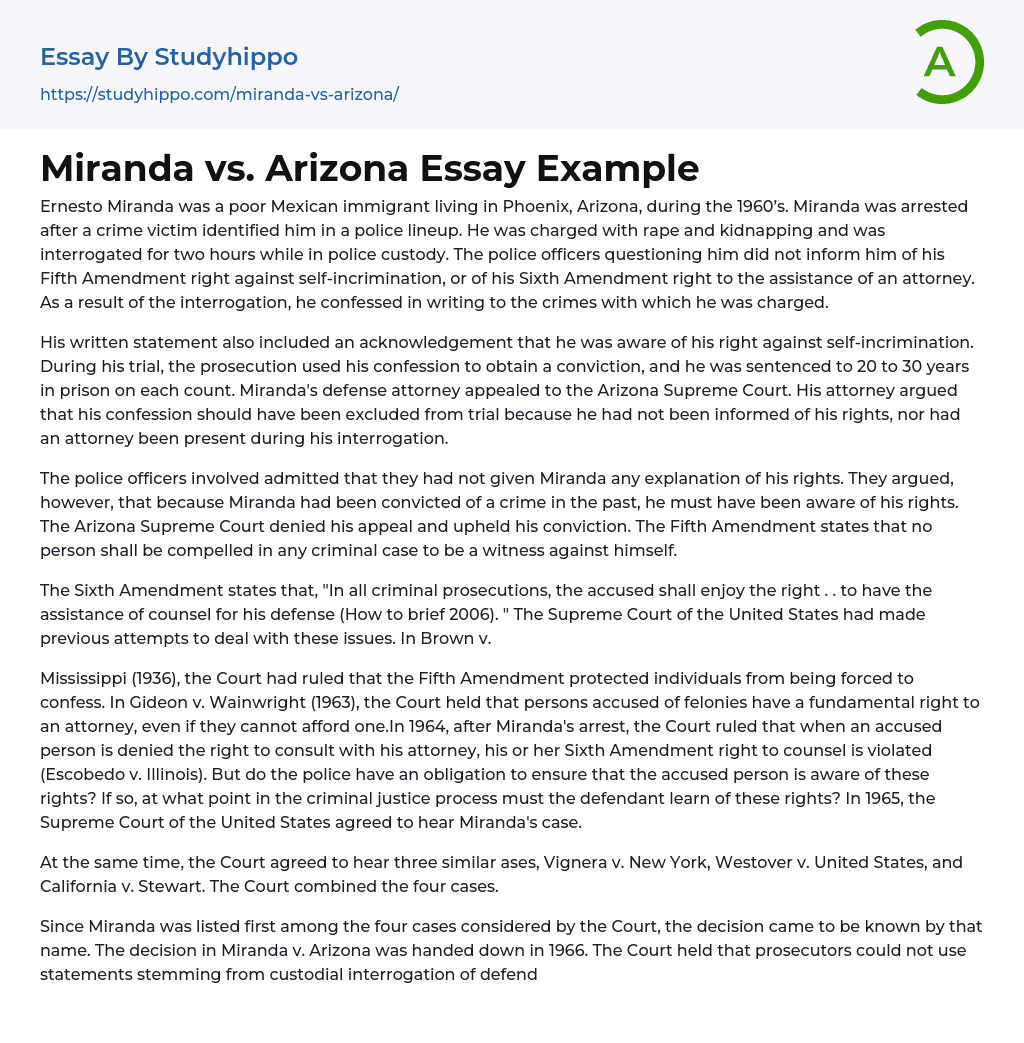In Phoenix, Arizona, Ernesto Miranda was arrested for rape and kidnapping in the 1960s after being identified in a police lineup. While he was detained, he underwent two hours of interrogation without being informed of his rights as described by the Fifth and Sixth Amendments. As a result, he confessed to committing the crimes in writing.
Although Miranda acknowledged his right to remain silent in writing, the prosecution presented his confession during trial which led to a conviction and imprisonment of 20-30 years per charge. The defense lawyer appealed this verdict to the Arizona Supreme Court, arguing that Miranda's confession should not have been considered as he was not informed of his rights or provided with legal representation during questioning.
Although Miranda's rights were not explained by the police officers, they argued that he should have been aware of them d
...ue to a previous conviction. Consequently, the Arizona Supreme Court rejected his appeal and upheld his conviction. It is important to note that under the Fifth Amendment, individuals cannot be compelled to incriminate themselves during legal proceedings.
As per How to Brief (2006), the Sixth Amendment ensures that criminal defendants have the right to legal representation. The Supreme Court has previously dealt with this issue, as seen in Brown v. [source].The Court of Mississippi, in 1936, ruled that the Fifth Amendment safeguards individuals against being forced to confess. Later on, Gideon v. Wainwright (1963) decided that all persons accused of felonies have the right to legal representation regardless of their economic state. Also, the Escobedo v. Illinois case in 1964 established that if an accused person is denied access to their attorney, it violates their Sixth Amendment right
to counsel. However, there was still uncertainty as to whether police officers were responsible for informing defendants about these rights and when they should do so during criminal proceedings. In 1965, Miranda's case was accepted by the Supreme Court as a way of addressing such doubts.
Simultaneously, the Court granted a hearing to three comparable cases, namely Vignera v. New York, Westover v. United States, and California v. Stewart. Consequently, the Court consolidated all four cases.
The decision known as Miranda was rendered in 1966 and was the first among the four cases considered by the Court. In Miranda v. Arizona, the Court ruled that unless prosecutors proved the use of effective procedural safeguards to protect the privilege against self-incrimination, they couldn't use statements obtained from custodial interrogation of defendants. The Court highlighted that in-custody interrogation in modern times is focused more on psychology than physical means and that an unconstitutional investigation could take many forms, not just physical coercion (How to brief 2006).
The Court provided clear guidelines for police warnings given to suspects, which include informing them of their rights to remain silent and to have legal counsel present during questioning (How to brief 2006). Source: How to brief a case (2006). Retrieved January 12, 2006, from http://www.lib.jjay.cuny.The URL for the research briefing page can be found at
edu/research/brief.html
.
- Travel essays
- Asia essays
- Caribbean essays
- Developing Country essays
- America essays
- City essays
- Africa essays
- Australia essays
- Europe essays
- Georgia essays
- Middle East essays
- New Zealand essays
- South Korea essays
- Thailand essays
- Afghanistan essays
- Dubai essays
- North Korea essays
- Natural Disaster essays
- Earthquake essays
- Fracking essays
- Mountains essays
- Restaurant essays
- Hospitality essays
- Business Travel essays
- Hotels essays
- Tourism essays
- World Tourism Organization essays
- Kids travel essays
- Travel Agency essays
- ecotourism essays
- Air Travel essays
- Sea Travel essays
- Cathedral essays
- Traveling essays
- Fast Food Restaurant essays
- Motel essays
- Cultural Tourism essays
- The real essays
- Airlines essays
- Airports essays
- Boeing essays
- Low-Cost Carrier essays
- Easyjet essays
- Bangladesh essays
- Kuala Lumpur essays
- Malaysia essays
- Manila essays
- Philippines essays
- Singapore essays
- Vietnam essays




